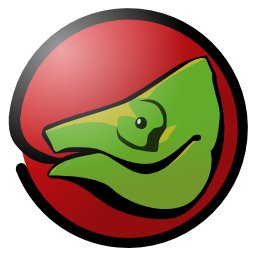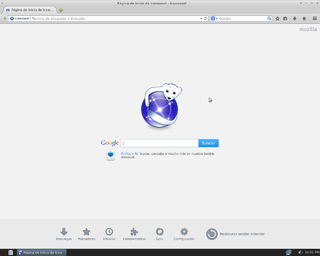| Developer(s) | Mozilla Foundation and community |
|---|---|
| Initial release | February 2006 |
| Final release | 41.0.2 / October 15, 2015 |
| Written in | C++, XUL, XBL, JavaScript |
| Operating system | Cross-platform |
| Type | Runtime environment |
| License | MPL |
| Website | developer |
XULRunner is a discontinued, [1] [2] packaged version of the Mozilla platform to enable standalone desktop application development using XUL, developed by Mozilla. It replaced the Gecko Runtime Environment, a stalled project with a similar purpose. [3] The first stable developer preview of XULRunner was released in February 2006, based on the Mozilla 1.8 code base. Mozilla stopped supporting the development of XULrunner in July 2015. [1] [2]
XULRunner was a "technology experiment", not a shipped product, [4] meaning there were no official XULRunner releases, only stable builds based on the same code as a corresponding Firefox release.
XULRunner is a runtime that can be used to bootstrap multiple XUL + XPCOM applications that are equal in capabilities to Firefox and Thunderbird.
XULRunner stores a variety of configuration data (bookmarks, cookies, contacts etc.) in internally managed SQLite databases, and even offer an add-on to manage SQLite databases.
Mozilla Firefox, Mozilla Thunderbird, Nightingale, Songbird, Flickr Uploadr, SeaMonkey, Conkeror, Sunbird, Miro, Joost, and TomTom Home 2.0 ran on XULRunner. Starting with version 3.0, Mozilla Firefox uses a "private" XULRunner, [5] meaning the framework is installed locally in the application directory.
Kiwix, an offline browser for Wikipedia and Project Gutenberg, used XULRunner until 2017.
The Google AdWords Editor used XULRunner [6] until 2010, [7] as did Evergreen ILS, an open-source library automation system.
The fourth version of the video game series Simon the Sorcerer, Simon the Sorcerer 4: Chaos Happens , uses XULRunner.
In addition, the XULRunner package provided access to ActiveX Control functionality previously found in a (now defunct) third-party ActiveX Control built off the Mozilla source code. Applications using this application programming interface (API) may have function with XULRunner installed and registered.
Starting with Lotus Notes version 8.5.1, IBM deployed XULRunner to provide Notes client support for XPages applications.
In January 2014, dropping XULRunner support was discussed by Mozilla developers. [8] In July 2015, Mozilla stopped supporting the development of XULrunner, [1] [2] and the community page has been taken down. [9] As of the beginning of 2016, it had been dropped from the package database of most Linux distributions, including Gentoo, [10] Debian, [11] [12] and Ubuntu. [13] [14]
XULRunner can still be installed separately, and many XULRunner-dependent applications can be switched over fairly easily. Also developing and running XULRunner apps is still possible through Firefox as well as previous or custom builds of XULRunner. [15] However, its disappearance has caused some dependent packages to be removed from package databases. [16]

K-Meleon is a free and open-source, lightweight web browser for Microsoft Windows. It uses the native Windows API to create its user interface. Early versions of K-Meleon rendered web pages with Gecko, Mozilla's browser layout engine, which Mozilla's browser Firefox and its email client Thunderbird also use. K-Meleon became a popular Windows browser and was available as an optional default browser in Europe via BrowserChoice.eu. K-Meleon continued to use Gecko for several years after Mozilla deprecated embedding it. Current versions of K-Meleon use the Goanna layout engine, a fork of Gecko created for the browser Pale Moon.
Gecko is a browser engine developed by Mozilla. It is used in the Firefox browser, the Thunderbird email client, and many other projects.
Cross Platform Component Object Model (XPCOM) is a cross-platform component model from Mozilla. It is similar to Microsoft Component Object Model (COM) and Common Object Request Broker Architecture (CORBA). It features multiple language bindings and interface description language (IDL) descriptions; thus programmers can plug their custom functions into the framework and connect it with other components.
A computing platform, digital platform, or software platform is an environment in which software is executed. It may be the hardware or the operating system (OS), a web browser and associated application programming interfaces, or other underlying software, as long as the program code is executed using the services provided by the platform. Computing platforms have different abstraction levels, including a computer architecture, an OS, or runtime libraries. A computing platform is the stage on which computer programs can run.
XUL, which stands for XML User Interface Language, is a user interface markup language developed by Mozilla. XUL is an XML dialect for writing graphical user interfaces, enabling developers to write user interface elements in a manner similar to web pages.

GNOME Web, called Epiphany until 2012 and still known by that code name, is a free and open-source web browser based on the GTK port of Apple's WebKit rendering engine, called WebKitGTK. It is developed by the GNOME project for Unix-like systems. It is the default and official web browser of GNOME, and part of the GNOME Core Applications.
Mozilla Thunderbird is free and open-source email client software which also functions as a full personal information manager with a calendar and contactbook, as well as an RSS feed reader, chat client (IRC/XMPP/Matrix), and news client. Available cross-platform, it is operated by the Mozilla Foundation's subsidiary MZLA Technologies Corporation. Thunderbird is an independent, community-driven project that is managed and overseen by the Thunderbird Council, which is elected by the Thunderbird Community. The project strategy was originally modeled after that of Mozilla's Firefox web browser and is an interface built on top of that web browser.
XPInstall is a technology used by the Mozilla Application Suite, SeaMonkey, Mozilla Firefox, Mozilla Thunderbird and other XUL-based applications for installing Mozilla extensions that add functionality to the main application.

SeaMonkey is a free and open-source Internet suite. It is the continuation of the former Mozilla Application Suite, based on the same source code, which itself grew out of Netscape Communicator and formed the base of Netscape 6 and Netscape 7.
The Mozilla application framework is a collection of cross-platform software components that make up the Mozilla applications. It was originally known as XPFE, an abbreviation of cross-platform front end. It was also known as XPToolkit. To avoid confusion, it is now referred to as the Mozilla application framework.

In 2006, a branding issue developed when Mike Connor, representing the Mozilla Corporation, requested that the Debian Project comply with Mozilla standards for use of the Thunderbird trademark when redistributing the Thunderbird software. At issue were modifications not approved by the Mozilla Foundation, when the name for the software remained the same.

Mozilla Firefox 3.0 is a version of the Firefox web browser released on June 17, 2008, by the Mozilla Corporation.

GNU IceCat, formerly known as GNU IceWeasel, is a completely free version of the Mozilla Firefox web browser distributed by the GNU Project. It is compatible with Linux, Windows, Android and macOS.
A browser toolbar is a toolbar that resides within a browser's window. All major web browsers provide support to browser toolbar development as a way to extend the browser's GUI and functionality. Browser toolbars are considered to be a particular kind of browser extensions that present a toolbar. Browser toolbars are specific to each browser, which means that a toolbar working on a browser does not work on another one. All browser toolbars must be installed in the corresponding browser before they can be used and require updates when new versions are released.

Kiwix is a free and open-source offline web browser created by Emmanuel Engelhart and Renaud Gaudin in 2007. It was first launched to allow offline access to Wikipedia, but has since expanded to include other projects from the Wikimedia Foundation, public domain texts from Project Gutenberg, many of the Stack Exchange sites, and many other resources. Available in more than 100 languages, Kiwix has been included in several high-profile projects, from smuggling operations in North Korea to Google Impact Challenge's recipient Bibliothèques Sans Frontières.
Pale Moon is an open-source web browser with an emphasis on customization; its motto is "Your browser, Your way". There are official releases for Microsoft Windows, FreeBSD, macOS, and Linux, as well as contributed builds for various platforms.
Emscripten is an LLVM/Clang-based compiler that compiles C and C++ source code to WebAssembly, primarily for execution in web browsers.
Mozilla is a free software community founded in 1998 by members of Netscape. The Mozilla community uses, develops, publishes and supports Mozilla products, thereby promoting exclusively free software and open standards, with only minor exceptions. The community is supported institutionally by the non-profit Mozilla Foundation and its tax-paying subsidiary, the Mozilla Corporation.

Goanna is an open-source browser engine and part of Unified XUL Platform that was forked from Mozilla's Gecko. It is used in the Pale Moon and Basilisk browsers. It underlies the Interlink mail client, Hyperbola's IceWeasel, and other UXP-based applications. It was also unofficially ported to Windows XP for the K-Meleon browser and Mypal.